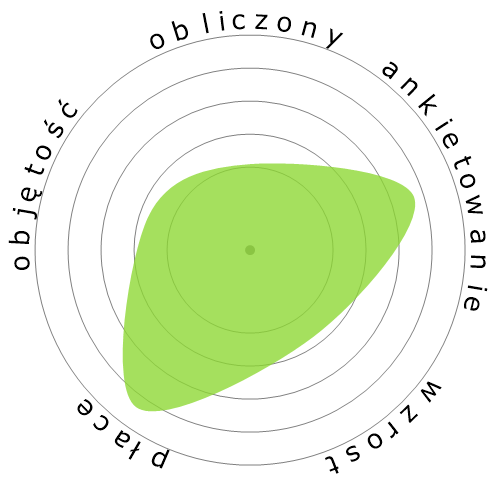Piloci linii lotniczych, drugi piloci i inżynierowie pokładowi
Dokąd chciałbyś się udać dalej?
Lub, zbadaj ten zawód bardziej szczegółowo...


Co przedstawia ten płatek śniegu?
Co to jest?
Oceniamy prace, biorąc pod uwagę cztery czynniki. Są to:
- Szansa na automatyzację
- Wzrost zatrudnienia
- Wynagrodzenie
- Liczba dostępnych stanowisk
Są to kluczowe rzeczy, o których warto pomyśleć podczas poszukiwania pracy.
Ludzie również oglądali
Obliczone ryzyko automatyzacji
Wysokie ryzyko (61-80%): Zawody w tej kategorii stoją przed znaczącym zagrożeniem ze strony automatyzacji, ponieważ wiele z ich zadań może być łatwo zautomatyzowanych przy użyciu obecnych lub bliskich przyszłości technologii.
Więcej informacji na temat tego, czym jest ten wynik i jak jest obliczany, jest dostępne tutaj.
Ankieta użytkownika
Nasi goście zagłosowali, że jest małe prawdopodobieństwo, iż ten zawód zostanie zautomatyzowany. Jednakże, poziom ryzyka automatyzacji, który wygenerowaliśmy, sugeruje znacznie większą szansę na automatyzację: 65% szans na automatyzację.
Jakie są Twoje zdanie na temat ryzyka automatyzacji?
Jakie jest prawdopodobieństwo, że Piloci linii lotniczych, drugi piloci i inżynierowie pokładowi zostanie zastąpione przez roboty lub sztuczną inteligencję w ciągu najbliższych 20 lat?
Nastroje
Poniższy wykres jest wyświetlany tam, gdzie jest wystarczająca liczba głosów, aby uzyskać znaczące dane. Przedstawia wyniki ankiet użytkowników w czasie, dając wyraźny obraz trendów nastrojów.
Nastroje w czasie (rocznie)
Wzrost
Liczba ofert pracy na stanowisku 'Airline Pilots, Copilots, and Flight Engineers' ma wzrosnąć 5,0% do 2033
Całkowite zatrudnienie oraz szacowane oferty pracy
Zaktualizowane prognozy mają być dostępne 09-2025.
Płace
W 2023, mediana rocznej pensji dla 'Airline Pilots, Copilots, and Flight Engineers' wynosiła 219 140 $, czyli 105 $ za godzinę.
'Airline Pilots, Copilots, and Flight Engineers' otrzymali wynagrodzenie wyższe o 356,0% od średniej krajowej, która wynosiła 48 060 $
Płace z biegiem czasu
Objętość
Od 2023 roku zatrudnionych było 93 670 osób na stanowisku 'Airline Pilots, Copilots, and Flight Engineers' w Stanach Zjednoczonych.
To oznacza około 0,06% zatrudnionej siły roboczej w całym kraju.
Inaczej mówiąc, około 1 na 1 tysiąc osób jest zatrudnionych jako 'Airline Pilots, Copilots, and Flight Engineers'.
Opis stanowiska pracy
Pilotuj i nawiguj lot samolotów o stałym skrzydle, zazwyczaj na trasach regularnych przewoźników lotniczych, w celu transportu pasażerów i ładunków. Wymagane jest posiadanie certyfikatu Federalnego Transportu Lotniczego oraz oceny dla konkretnego typu używanego samolotu. Obejmuje to pilotów linii lotniczych na szczeblu regionalnym, krajowym i międzynarodowym, a także instruktorów lotów pilotów linii lotniczych.
SOC Code: 53-2011.00
Komentarze (87)
20 years it will start with cargo flights.
Another 10 years after maybe commercial flights.
If an accident happens like where two planes go down due to MCAS designed by boeing. This probably set it back years for automation.
Look at Sully landing on the Hudson can a computer do that?
Miracle on the Hudson that was down to skill and knowledge and a brilliant Captain and First Office.
Capacity to AI takeover already exist but passanger trust will take longer to be achieved.
Most emergencies or abnormal events are known about and there are checklists to deal with them, but not every situation is the same or black and white. My specialty is flying airplanes, not computer science, but I find it hard to imagine current AI being able to properly handle a plane in an emergency, especially if it is a new situation.
There is also public opinion. I don’t like the idea because it takes a lot of jobs away, and I know many others don’t like the idea of a couple of hundred people being flown in an airplane completely controlled by AI.
The FAA is also notoriously slow with changing and adapting the rules. They have plenty of rules that are outdated and strange policies, but most of it is in the interest of safety. They prohibit people from flying unless they meet specific physical and mental health criteria. To my knowledge, pilots aren’t allowed to have any form of mental illness, and can’t take antidepressants or other similar things which could easily be treated.
The point I’m making here is that they’re slow to change and this big change would certainly take a while.
Odpowiedz na komentarz